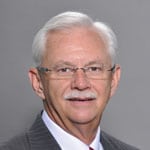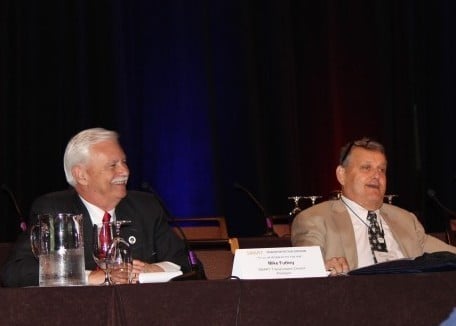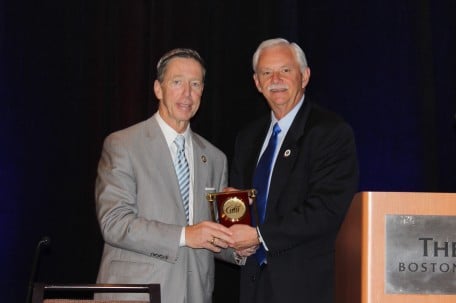 WASHINGTON – The U.S. Department of Transportation’s Federal Motor Carrier Safety Administration (FMCSA) July 3 announced almost $1 million in new grants to help train veterans and military families for jobs in the transportation industry. The grants were awarded to six colleges across the country as part of the Commercial Motor Vehicle Operator Safety Training (CMVOST) grant program.
WASHINGTON – The U.S. Department of Transportation’s Federal Motor Carrier Safety Administration (FMCSA) July 3 announced almost $1 million in new grants to help train veterans and military families for jobs in the transportation industry. The grants were awarded to six colleges across the country as part of the Commercial Motor Vehicle Operator Safety Training (CMVOST) grant program.
“The least we can do for the men and women who put their lives on the line for our country is to help ensure they can find good jobs when they leave the service,” said U.S. Secretary of Transportation Anthony Foxx. “The transportation industry provides a unique opportunity for military families and veterans to utilize skills they developed in the service, and we hope these grants will lead to more veterans joining the ranks of our country’s commercial vehicle drivers.”
The Bureau of Labor Statistics lists commercial trucking as a high-demand job, with more than 300,000 additional positions expected by 2020.
“These grants represent one of the many steps the Federal Motor Carrier Safety Administration has taken to help veterans as they move from military to civilian life,” said FMCSA Administrator Anne S. Ferro. “From allowing states to consider military experience in their licensing tests to supporting industry job fairs, we are committed to helping our veterans transition into quality jobs.”
FMCSA awarded the following CMVOST grants, which could provide training for as many as 300 new students across the six colleges:
- Grays Harbor College in Aberdeen, Wash., $131,041
- Long Beach Community College District, in Long Beach, Calif., $211,733
- Orangeburg-Calhoun Technical College in Orangeburg, S.C., $150,000
- Lone Star College in Woodlands, Texas, $184,260
- Century College in White Bear Lake, Minn., $120,000
- Joliet Junior College in Joliet, Ill., $176,427
In May 2011, the FMCSA finalized its commercial learner’s permit rule, which gives state driver licensing agencies the authority to waive the skills test portion of the commercial driver’s license test if the applicant demonstrates two years of safe driving experience in military equivalents of commercial motor vehicles. Visit http://www.fmcsa.dot.gov/registration-licensing/cdl/Military-CDL-Waiver.aspx for more information.
To learn more about FMCSA’s commercial truck and bus safety grant programs and other safety initiatives, visit the FMCSA website at www.fmcsa.dot.gov.
To learn more about the U.S. Department of Transportation’s dedication to our nation’s veterans, visit http://www.dot.gov/veteranstransportationcareers.
 Sen. Robert P. Casey Jr. (D., Pa.) made a whistle-stop plea July 8 for Congress to block efforts to cut Amtrak funding 31 percent.
Sen. Robert P. Casey Jr. (D., Pa.) made a whistle-stop plea July 8 for Congress to block efforts to cut Amtrak funding 31 percent. WASHINGTON – The crash landing of a South Korean airliner in San Francisco has revived concerns that airline pilots get so little opportunity these days to fly without the aid of sophisticated automation that their stick-and-rudder skills are eroding.
WASHINGTON – The crash landing of a South Korean airliner in San Francisco has revived concerns that airline pilots get so little opportunity these days to fly without the aid of sophisticated automation that their stick-and-rudder skills are eroding.

